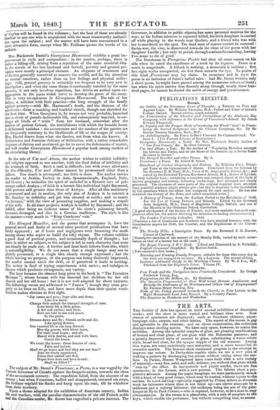The Strayed Reveller, and the poems that accompany it, have
the general merit and faults of several other poetical publications that have lately appeared ; as if haste and negligence were becoming the mode among those who aspire to build the lofty rhyme. The volume exhibits a good deal of poetical power, and occasionally depth of thought • but there is either no subject, or the subject is left in such obscurity that none can clearly be made out. A further and fatal fault follows from this, which is unintelligibility. We do not mean that a single image may not be plainly presented, or a single idea clearly enough expressed ; but the whole having no purpose, or the purpose not being distinctly impressed, the reader cannot catch the drift, or if perceived it leads to nothing. The writer is fond of trying experiments with metre ; and indulges in licence which produces strangeness, not variety. The best because the clearest long piece in the book is "The Forsaken Merman "; whose human wife has deserted her children for her old church and her old home : but it is not well adapted for short extracts. The following verses are addressed to " Fausta ' ; though they seem pro- perly to be lines on Life, and have more depth than their quaint versi- fication makes obvious at first sight.
"Joy comes and goes; hope ebbs and flows,
Like the wave.
Change doth unknit the tranquil strength of men. Love lends life a little grace, A few sad smiles; and then, Both are laid in one cold place, In the grave.
Dreams dawn and fly ; friends smile and die, Like spring flowers. Our vaunted life is one long funeral.
Men dig graves, with bitter tears,
For their dead hopes ; and all,
Mazed with doubts, and sick with fears, Count the hours.
We count the hours: these dreams of ours, False and hollow, Shall we go hence and find they are not dead ? Joys we dimly apprehend, Faces that smiled and fled, Hopes born here and born to end: Shall we follow ?"


























 Previous page
Previous page